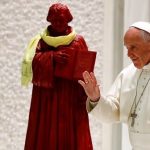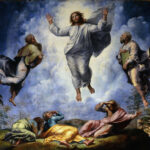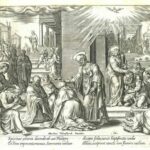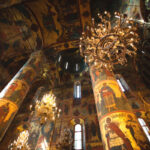I wanted to talk about a specific book that I read many years ago and that left a mark in my memory: Stranger in the Forest: On Foot Across Borneo, by Eric Hansen. Please be patient, in due time I’ll explain why and what this holiday has to do with it.
Pentecost Sunday. Mass during the Day (Year A)
Another Easter season coming to a close; caught up in the routine and focusing on the main theme, we run the risk of losing sight of some usually neglected details of the Pentecost.
Luckily I’m here at your service, to cross the T’s and dot the I’s so you don’t have to.
The Gospel reading shows us Jesus coming when the doors are closed and effusing the Holy Spirit. Later, according to Acts, the Spirit descends more or less on the same group of people, the Apostles. Or maybe not exactly the same? This event is reported immediately after a mention of the Apostles in Chapter 1 (twelve again after the replacement of Judas)… but shortly before that, in verse 14 Mary was also mentioned, as part of a prayer group centered around the apostles themselves; this group included some unspecified women, and the “brothers” of Jesus.
Now… Let’s avoid getting caught in a digression on the story of Jesus’ relatives, called brothers for various reasons (in Aramaic the very same word was used for cousins too); as is well known, Protestants here jumped at the opportunity to claim to have found proof positive that Mary -allegedly- had a normal family like everybody else, in fact giving birth to a large number of babies… Maybe we’ll discuss this another time.
But I want to emphasize an initial result:
-The core, the kernel of the Church consists of families. The family dimension is fundamental, indispensable.
In fact it’s true the very foundation were individual men who had been chosen (though some were related to each other), but alongside them we find, in this first Church group, some close relatives. This is apparent since there’s no mention of men that weren’t family, and consequently the women of the group were mothers, sisters, (wives?) and perhaps daughters… otherwise one couldn’t explain what they were doing there.
Also in chapter 1, in the next verse Peter speaks to about 120 people.
So… we have the stable group of the Apostles with their families, then the text speaks of 120 in attendance, then again of the Apostles, and finally we get to the reading, the account of the Pentecost, where the Spirit descends on “all” (!).
Who are these all?
The interpretation given by the Church is indeed reasonable; it doesn’t consider the 120 of Peter’s speech, which is a separate event, but instead considers the group that was assiduously with the Apostles in those days: including Our Lady. And even if I find this tradition, that places Mary alongside and before the Apostles in this situation, in a privileged position, something both beautiful to contemplate and opportune, I cannot help but notice that the Spirit must have also descended on the rest of the group: brothers and women.

Unknown Portuguese, Pentecost , c.1520 (CC BY-SA 4.0, Sailko)
Alternative accounts?
There’s an obvious reaction that many self-proclaimed skeptic thinkers would give voice to, I can almost hear them saying something like:
“… the descent of the Spirit means nothing, in fact it’s sort of an expected element in a fictional story of this sort, and if there are surprising scenic details, presumed miracles, well, we don’t even have to comment on the plausibility of those. But note: in these two readings, two different (evidently alternative) traditions on the descent of the Spirit are brought to our attention. In practice they’d cancel each other out: with their very existence they show us the entire story was in a state of flux, hardly well defined: different influential people placed the desired event, the descent of the Spirit, at different points in the story.”
On the contrary, realism is the antidote to the superficial attitude of those who, after limited study, try to belittle and circumscribe events and stories that for those directly involved took up years.
Where a sort of mental economy, or rather mental stinginess, chooses to condensate events and assumes that the Spirit must descend once and for all, the life of the Church is instead normally marked by multiple, almost continuous gifts: the Spirit descends throughout everyday life, albeit discreetly; on another occasion I had remarked how familiar the primitive community was with God, through the sacraments, just like the Church of today.
After all there’s no specific reason to see the two events recounted today as alternative, and they are indeed decidedly complementary.
In one case we have a protochurch, that includes all the faithful. And all (miraculously) give their testimony, speaking to people from all over the world. On a symbolic level this is so appealing and wholesome, isn’t it?
– We are all called to preach and bring the Gospel message to all peoples.
In the other episode, the group is more restricted: these are the Apostles. Note the difficulty: the Gospel of John calls them disciples (mathités), which is a generic term which in other cases would also indicate other people who simply follow Jesus as a teacher. But from the context (they are dispersed, isolated for fear of the Jews, a skeleton group) and from the fact that immediately afterwards the Gospel discusses Thomas, one of the Twelve who wasn’t present at the first meeting, we can clearly infer this is specifically the special group of the apostles. Simply put, John does not use the word apostle to designate them (it appears only once in the whole Gospel, and in its proper meaning of envoy). Yes, I know, we already discussed this type of difficulty: it’s a complicated matter.
That said, here the Holy Spirit is given in a different fashion and for a utterly different goal.
Indeed, the Apostles got a onerous task to fulfill: to administer God’s justice, for the small portion entrusted to them: to forgive people in the name of Jesus himself! Please notice, this is not a trivial exhortation: part of their calling is also, as the Master explicitly says, a sort of mirror power : NOT to forgive people who, for this very reason (!), will remain unforgiven…
Behold: a power, a duty, a hard job. The action of God who chooses to go through his representatives, however fallible. Not desirable for them actually, but it is what it is. Here we can appreciate, once again, a key element defining the real Church, the Apostolic Church, compared to the wannabe churches born out of a protest.
-Confession, or Reconciliation, is affirmed here, which for this reason is a Sacrament: a sacred act in which God makes himself present, and in which He forgives.
And this isn’t performed internally, in your mind.
No, it’s an event that takes place at a given time, in a specific place, through a person who is God’s representative, albeit unworthily; because he received the Holy Ghost for that purpose. With supernatural effects. That is definitely something…
Here, again, we can create a mental note, for when someone comes up with exorbitant claims, like the idea that sacraments were invented centuries later.
To further bring the point home, it’s also clear that we’re speaking of the Apostles here, and in any case of special people chosen by God or delegated by the apostles, if we look at 2Corinthians 5,18-20: Saint Paul speaks in the name of the shepherds whom he also calls ambassadors for Christ;
God, who has reconciled us to himself through Christ and given us the ministry of reconciliation.
Thus, the two passages of Pentecost assume a truly beautiful and complementary role:
first, Jesus gives the Spirit to his chosen, appointed disciples: so that they may forgive and reconcile the faithful to him;
then the Spirit descends on the embryo of the Church, to give a sign of call, for all the faithful, to bear witness and preach to the whole world.
Diversity of charisms! Who knew! Just what the Second Reading is about.
The miracle
As for the noise and tongues of fire, I’d like to point out to the skeptics that on the occasion of the apparitions of Fatima the so-called Miracle of the Sun took place in front of a large crowd, including many atheists who had to testify and confirm what they saw, and many converted. We were already in the twentieth century, in an age of science and skepticism. Yet the striking, spectacular miracle took place. One may object: “it appeared to be the case, but there must have been a different explanation”… Well, this alternative explanation hasn’t been found anyway: you must therefore admit that, one way or another, such inexplicable events do happen on certain occasions!
Anyone caring to tell me why, for what reason, something equally striking could not have happened in a much more decisive moment, such as that day of Pentecost with the Apostles?
I’m not saying that I know the miracle of Pentecost was real and supernatural in nature. Instead I want to say (and this is trivial), that you can’t play the part of the sophisticated observer who doesn’t buy it, because the only reason you don’t want to believe a miracle was real is that you don’t believe in God, and the rest follows as a consequence.
So… it is one thing to say that the existence of God is actually NOT proved by ancient miracles, which for us are just hearsay. It is another thing to assume that such miracles did not happen!
We’ve really gotten used to this: always thinking that the possibility that things went as reported by our sources would be “too much to ask”!
We need to detoxify our perspective.
And speaking in tongues, what did it consist of? Here we have a wide range of possibilities: first of all in the more or less imaginative reconstruction, possibly performed many years after the event, which potentially magnified or deformed the memory of it. Beyond that we might identify a few alternatives, in order from the most trivial explanation to the greatest miracle:
1. people who mumble sounds, emit meaningless phonemes, but which are at times benevolently interpreted by those present as hints of words of their own language, words that sound similar;
2. a moment of maximum mental clarity on the part of the Apostles leads them to unleash the best of their knowledge; they actually discover that they are able to make themselves understood in various languages of which they know the rudiments, and some foreigners catch something and are impressed (the list of languages is then extended as time passes, in subsequent revisions of the story);
3. they momentarily gain extra skills, hence they manage, without knowing how, to speak in various languages, saying a few appropriate words to each group of those present (similar to a modern day audience in the Vatican, with a succession of greetings and blessings for each linguistic group, but without having ever studied those languages);
4. somehow, while continuing to speak in Aramaic, the people who listen to them manage to hear, at the same time, a speech in their own language.
And perhaps there are still other possibilities that escape me.
So let’s see.
Case 2 is the most far fetched, because, no matter how hard you try, you don’t get such extraordinary ideas from a few words thrown out by wannabe speakers possessing little knowledge: this represents an attempt to come up with a rationalist explanation, but it’s more appropriately described as grasping at straws. This is not how a story of an extraordinary fact originates. We need something more disruptive. If on the contrary you believe that the original event had been inflated so much, it would be even easier to consider it invented from scratch and be done with it.
Case 4 is just a particular version of case 3, certainly a little more striking. Mental note added; there are only two alternatives left, now.
Case 1 is what many may have imagined: meaningless ramblings, weird vocalizations, then imaginatively reinterpreted.
Well, far from being an extravagant claim, a malicious accusation, or on the contrary an embarrassing secret finally revealed to the masses… this phenomenon, usually known as glossolalia, is well known, widespread and often discussed, inside and outside the Church.
The alternative, in which instead there really are those who speak foreign languages without having learned them, and they make themselves understood well, has been named xenoglossia (or sometimes xenoglossy). A phenomenon that would be impossible to obtain, by definition, through natural means: to be clear, something that never happened from the point of view of the skeptics of CSICOP.
A significant observation to make at this point: any considerations on how the story may have been deformed over time, starting from the initial testimonies, becomes quite unnecessary and hardly relevant from now on. If it was just glossolalia, i.e. a psychological issue that was just misunderstood as something more, the miracle implodes into nothingness. And it’s so easy to come by, so simple as an alternative explanation, that it makes no sense to look for other, significantly convoluted explanations, if you want to disbelieve. If on the contrary it was xenoglossy, there’s nothing to add here: there is God, and it’s Jesus.
So we have condensed the whole issue to this bifurcation.
Glossolalia or xenoglossia?
And here we are: I promised an unexpected digression. What does the book Stranger in the Forest: On Foot Across Borneo by Eric Hansen have to do with all of this?
Well, Hansen wrote a light-hearted and inspiring account, full of insights, recollecting his crossing the Indonesian island of Borneo on foot, during 7 months, in 1982. Mostly immersing himself in the local culture: more than simply exploring and traversing a forest.
It is therefore with a calm detachment that he also contemplates the few encounters with other Westerners he had, including some missionaries.
I went back to my old paper copy to find the piece that mattered to me right now, discussing missionaries, in fact. Odd: it’s not clear whether those were Catholic or Protestant, in fact Hansen mentions a mass but we cannot recognize that gathering as such, from his words: the Eucharist is completely absent. Anyway, here are my highlights:
– the church service with the group of faithful, belonging to the Penan people, begins with a sermon that the author doubts anyone would be able to understand, due to the language barrier.
– Then begins the moment of individual prayer, according to the customs of the missionaries, i.e. the Kelabit people: loud pleas, everyone speaks and at the same time, overlapping chaotically. A pandemonium.
– An elderly lady steals the show: she yells an exorbitant amount of times “Thank you, Lord” in her own language, clapping her hands, in a crescendo.
– The impression of the author, and it’s reasonable: she’s driven by the desire to demonstrate her faith through the intensity of the effort. As if she wanted to please the pastor. While the others get quiet, she continues, now sweaty and in tears.
– The pastor appears worried, the mass is ruined.
– The woman suddenly falls on her back and starts making strange sounds, in a trance state. Hansen himself is now interested, wants to hear if she’s speaking in some (to her) unknown language. He leans forward to hear better, but he cannot make sense of the stammering. Nobody can: these are definitely not words, in any language.
– Everyone hugs her and tries to comfort her.
– She goes on for another 5 minutes, then stops, exhausted.
– The pastor wipes his forehead and breathes a sigh of relief.
Hansen adds that encounters with the Holy Spirit in those populations have become very popular, effectively replacing the ancient custom of having freshly cut human heads in the community house, to “warm up” a spirituality that had cooled down.
People “possessed by the Spirit”, able to speak in tongues and heal, according to the Penan.
Why did I mention this story?
This is a textbook case of glossolalia, and it would be really naive to believe that it arises from some odd imposition on the part of Christian missionaries. There’s instead something more primitive, I would say ancestral, in these efforts. Puffing and wiping their foreheads, these men of the cloth try to channel a naive, instinctive reaction towards a more orderly spirituality. But such practice represents also a significant personal experience; a way, however questionable, of placing oneself in subjective contact with God. Isn’t it perhaps true that far beyond plain and simple prayer, many peoples have sought a trance, even under the influence of drugs, to get into deep meditation and further?
Before looking down on this sort of things with condescension, I invite you to reflect on an objective fact: Christianity has led communities to favor a rational approach, always looking with distrust at potentially destabilizing and irrational manifestations. It is precisely the modern Western post-Christians who have begun to reject a religiosity made up of doctrines and dogmas, to throw themselves with conviction into Eastern spirituality: mantras, meditations, techniques. A gigantic how: experiential, emotional, instead of a why.
It is no coincidence that charismatic religious movements, especially in Protestantism, are born to meet this type of requests. “Don’t give me a doctrine, give me an emotion”, they seem to say. Not just in recent times: the Shakers movement was born out of the Protestantism of the Puritans in the 18th century, as a group (allow me to say it out loud: of nuts) which among other things produced chaotic religious happenings, full of people screaming, shaking all over (from which the name shakers), producing incomprehensible sounds and “words”. Later they tried to… organize themselves better (!), introducing coordinated dancing, and songs.
Now, perhaps, you may better appreciate the anguish and the troubles of those who, as shepherds, are tasked with the duty to put such sheep in line. Considering just one is enough to mess up your plans.
Above all, let’s clarify: it is one thing to want to have a certain type of emotional, strong subjective experience, but in service of a faith that gets its meaning and foundation elsewhere. It would be quite another story, for a given person, to develop a strong conviction, of having received extraordinary gifts, to be able to speak new, mysterious, unknown languages; perhaps having the impression of being able to guide others, bringing them new revelations from the Spirit… while in reality this person, through an altered mental state, is just drawing noise from the primitive part of his/her brain.
Could these painful and pathetic pantomimes, which horrify anyone who isn’t already part of a self-selected group of aficionados for this genre, really have been the basis of an extraordinary experience of Pentecost, so much so that it was singled out as one of the central moments in the life of the Church?
I don’t believe this could be the case. You are certainly free to think so, but how reasonable is this idea? I’ts too easy to project onto distant people your perception of what can happen, treating them as characters in a play; people of whom we know very little, hence they can easily become caricatures, puppets in our hands.
There’s this attitude, of those who view themselves as immensely superior thanks to their living in the modern age (yet they know very little about those things they despise)… An attitude centered on the idea (prejudice) that once upon a time people were gullible and easily deceived.
On the contrary we can now begin to understand how these manifestations, between mysticism and hysteria, were not at all welcomed by the leaders of the nascent Church. Let’s go to the source, the First Letter to the Corinthians (not much further than the passage presented in the Second Reading): here Paul admonishes, corrects, sets limits, scolds.
In chapter 14, in particular, he is concerned with putting order in the assemblies, with specific reference to the so-called gift of tongues. I invite you to read in full what he writes, since I won’t repost it here so as not to further burden the text.
I think many, faced with those words and in the light of what has been said so far, might agree with yours truly, and perhaps be like: look, this is news to me, I’ve never thought of it!
Paul is trying to flatteringly approach those who, let’s say, benefit from glossolalia, indeed at a certain point he says that he practices it like them and even more than them, but he doesn’t do it in front of others. But his message is clear: we need someone who speaks in the assembly in the name of God (literally: prophet), that is, someone who brings the intelligible message of the Gospel, and whose role is decidedly superior to that of those making incomprehensible sounds with enthusiasm.
Brothers, stop being childish in your thinking. […]
So if the whole church meets in one place and everyone speaks in tongues, and then uninstructed people or unbelievers should come in, will they not say that you are out of your minds?
Paul then goes on to indicate a series of restrictions to contain the phenomenon: in the number of those who give themselves to glossolalia, in giving them the possibility of doing so only if there is someone who acts as an “interpreter” and proclaims meaningful teachings without being overwhelmed by their cries; otherwise, let them shut up and keep the experience to themselves!
Embedded in this speech, full of exhortations and disciplinary rules, even with traits of harshness, and which he concludes by emphasizing two concepts that were close to his heart: dignity (doing things respectably, properly, with dignity, depending on the translation) and order …
Well, embedded in this speech peeps out a direct command to women: to keep quiet in the assembly. Which would seem strange. Paul, as we know, has quite a well-deserved reputation as a misogynist, but what about women here?
Let’s project ourselves into the situation. The apostles and the elders are all men, and we will not discuss this choice here (even if it were only pastoral in nature), but it is a fact. I suspect that, also due to various issues, including men being busy with work and other affairs, but also less incline to participate… even at that time, as it’s often the case today, a disproportionate number of women were present at a typical function (let’s also recall how Christianity at a certain point became a fashionable choice for wealthy Roman matrons, but perhaps not so much for their husbands).
Women that were used to be marginalized, not even being able to speak; and they were often, I would say, kept in a state of ignorance (sure, not their fault, but the negative consequences of that were a given).
Women who suddenly find an opportunity in this community which also recognizes their dignity, which was novel and encouraging. Put yourself in their shoes: even if, as a woman, I would never dare to speak publicly (all of a sudden!) and to impart new teachings to a large group… well, if I feel the Spirit entering me, a force that makes me utter mysterious words… uhm, that’s when I wouldn’t contain myself. On the contrary, I’d give it my all! Indeed, that would become my favorite religious experience. Intense, emotional.
In other words, not only did the situation in these congregations often get out of hand. But I bet almost always the chaos made of screams, meaningless words and inhuman blaring was totally dominated by female voices, in number and intensity. Preventing any chance to speak normally and teach.
It is not necessary to be a male chauvinist to understand the point of view of a shepherd who at a certain point blurts out: “Ladies, that’s enough. Now stop! Shut up!”
Well, I reread this passage after reading Hansen’s diary, and I couldn’t help but see in it a reaction to the very same type of situation: even a single woman manages to stall the whole celebration, just because she feels like playing this part.
Now, would you really want to argue that from these situations of chaos the tradition of xenoglossy on the day of Pentecost was born?
But that’s the last place where you’d want to go, if you were looking for a foundational experience of faith! These were precisely the worst aspects, which they were desperately trying to channel, compress, reduce to a minimum!
And in fact, thanks to guides like the Paul we have just read, the phenomenon slowly disappeared in the celebrations of the early Catholic Church.
-Only those who don’t understand the pain of those pastors can dream of thinking that they found it nice to invent a circumstance like the one described for the miracle of Pentecost, where the annoying intrusiveness of pseudo-charismatics could have become the model of how to be a Church!
Note also: on the one hand, Paul gives a voice to a rational Church, speaking for cooler heads: if strangers hear you, they’ll think you’re out of your minds. On the other hand, the circumstances of the miracle are precisely the most difficult situation one could think of, if the trick were to lie in a sympathetic bias, of bystanders wanting to find a meaning in unstructured blabbering: a crowd of strangers arrives, attracted by the loud noise. They’re wholly unprepared for what they’re facing, yet are favorably affected by it, and recognize their own languages.
Anything is possible, even that a series of coincidences and misunderstandings eventually led to interpreting one of the many episodes of glossolalia as if something completely different had happened, totally reversing the meaning of people’s reactions. But such outcome doesn’t really seem likely to me, it doesn’t account for the psychology of the protagonists; an explanation is missing, a plausible development. A cheap remark is just that, easy to throw: “they must have inflated, invented”. The logical depth of a language is not something that can be improvised through babbling: whoever listens to their coreligionist in a state of trance may try to imagine that they’re hearing unknown languages, but will never be able to recognize a real, proper language, unknown to the speaker.
Once again, what at a superficial glance appears at best impossible to evaluate, if not laughably naive, acquires credibility if you delve deeper: the miracle of xenoglossy, a simpler explanation after all.
Easier for those who do not start from the premise of excluding the possibility of miracles, seen as an almost impossible occurrence.
Some may reply: but xenoglossia and glossolalia are too similar not to raise suspicion!
Yet we have a clear example at hand, which shows us that this resemblance means nothing, much less suggests that the former could actually be the latter, through a misunderstanding or worse.
In fact, let’s go back to the miracle of Fatima: thousands of people who see the sun change color and size and move rapidly across the sky. Certainly it was not the sun performing those tricks, but whatever the local phenomenon that took place in the presence of so many witnesses, it is at least a remarkable case because it’s inexplicable and well documented.
But the story doesn’t end there: by imitation, every time some self-styled seer/prophet makes the news, some zealous followers starts staring at the sun without eye protection, believing they could witness a new miracle. With the result of going blind, or at least causing damage to their eyes.
Whatever the nature of the Fatima event, it’s not touched or put into question by the mere existence of wannabe imitators.
And the general principle also applies to miracles, in this intrinsically corrupt world of ours: one cannot abstain from something, just because there will inevitably be bad copies that make the original look bad in the eye of some.
Therefore, if put in the right perspective, the picture is recomposed naturally: glossolalia becomes a pale attempt to imitate xenoglossia.
It should be added that in fact, if staring at the sun did not produce any damage to health, today’s “Official Church” would also be quite indulgent towards this “experience”, which instead is logically treated as folly, given the effects.
This is where I should apologize: the attempt to be exhaustive, once and for all, took me away from the goal of a clear, direct, concise message. I’ll try to do better next time.










































